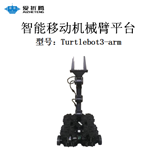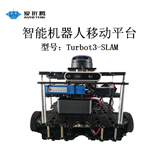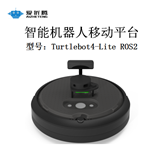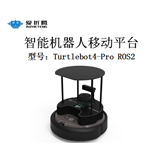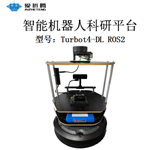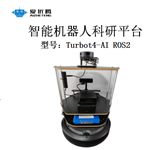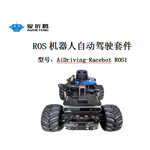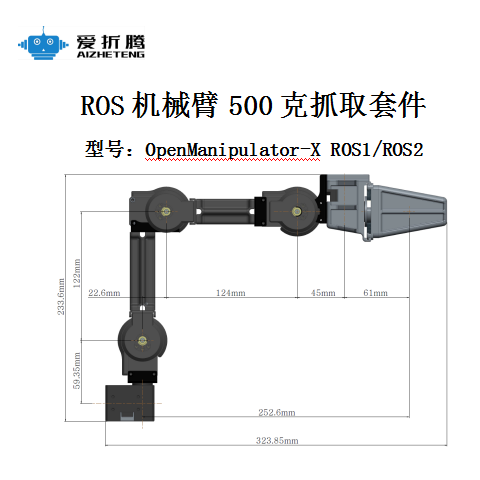ROS入门教程-1.2.6 在python中使用C++类 CATKIN方式
ROS入门教程-在python中使用C++类 CATKIN方式
说明:
- 本教程阐述一种在python中使用C++类的方法。
目录
没有Nodehandle的类
- 创建包和编写C++类
- 绑定,C++部分
- 绑定,Python部分
- 结合
- 测试
有NodeHandle的类
有ROS消息容器的类
std::vector<M>作为返回类型std::vector<M>作为参数类型
介绍:
本教程演示在Python使用带有ROS消息的C++类
用到Boost Python库
难点就是转换纯Python写的ROS消息的Python对象为等效的C++实例。
这个转换通过serialization/deserialization来实现
另一个解决方案是使用ROS服务,服务器端用C++编写封装成C++类,客户端可以用C++或Python编写,来调用服务。
这个方案没有创建ROS节点,提供的类不需要用到ros::NodeHandle。
另一个解决方案是为所有需要的ROS消息和依赖编写封装。一些显然过时的包装提出了这个任务的自动化解决方案:genpybindings和boost_ python_ros。
没有NodeHandle的类
- 因为调用rospy.init_node时候是不会初始化roscpp .
- ros::NodeHandle实例不能用在不产生错误的C++类
- 如果C++不使用ros::NodeHandle,是没有问题的
创建包和写c++类
创建包和C++类,这个类用于Python绑定,使用ROS消息作为参数和返回类型。
编写类头件定义到add_two_ints.h
catkin_create_pkg python_bindings_tutorial rospy roscpp std_msgs
cd python_bindings_tutorial/include/python_bindings_tutorial
touch add_two_ints.h
rosed python_bindings_tutorial add_two_ints.hinclude/python_bindings_tutorial/add_two_ints.h内容如下:
#ifndef PYTHON_BINDINGS_TUTORIAL_ADD_TWO_INTS_H
#define PYTHON_BINDINGS_TUTORIAL_ADD_TWO_INTS_H
#include <std_msgs/Int64.h>
namespace python_bindings_tutorial {
class AddTwoInts
{
public:
std_msgs::Int64 add(const std_msgs::Int64& a, const std_msgs::Int64& b);
};
} // namespace python_bindings_tutorial
#endif // PYTHON_BINDINGS_TUTORIAL_ADD_TWO_INTS_H
- 编写类实现到add_two_ints.cpp
roscd python_bindings_tutorial/src
touch add_two_ints.cpp
rosed python_bindings_tutorial add_two_ints.cpp
- src/add_two_ints.cpp内容如下:
#include <python_bindings_tutorial/add_two_ints.h>
using namespace python_bindings_tutorial;
std_msgs::Int64 AddTwoInts::add(const std_msgs::Int64& a, const std_msgs::Int64& b)
{
std_msgs::Int64 sum;
sum.data = a.data + b.data;
return sum;
}
绑定, C++ 部分
- 绑定通过两个封装类实现,一个C++编写,另一个Python编写。
- C++封装转换输入从序列化内容到C++消息实例,转换输出从C++消息实例到序列化内容
- 实现代码文件add_two_ints_wrapper.cpp:
roscd python_bindings_tutorial/src
touch add_two_ints_wrapper.cpp
rosed python_bindings_tutorial add_two_ints_wrapper.cpp
- src/add_two_ints_wrapper.cpp内容如下:
#include <boost/python.hpp>
#include <string>
#include <ros/serialization.h>
#include <std_msgs/Int64.h>
#include <python_bindings_tutorial/add_two_ints.h>
/* Read a ROS message from a serialized string.
*/
template <typename M>
M from_python(const std::string str_msg)
{
size_t serial_size = str_msg.size();
boost::shared_array<uint8_t> buffer(new uint8_t[serial_size]);
for (size_t i = 0; i < serial_size; ++i)
{
buffer[i] = str_msg[i];
}
ros::serialization::IStream stream(buffer.get(), serial_size);
M msg;
ros::serialization::Serializer<M>::read(stream, msg);
return msg;
}
/* Write a ROS message into a serialized string.
*/
template <typename M>
std::string to_python(const M& msg)
{
size_t serial_size = ros::serialization::serializationLength(msg);
boost::shared_array<uint8_t> buffer(new uint8_t[serial_size]);
ros::serialization::OStream stream(buffer.get(), serial_size);
ros::serialization::serialize(stream, msg);
std::string str_msg;
str_msg.reserve(serial_size);
for (size_t i = 0; i < serial_size; ++i)
{
str_msg.push_back(buffer[i]);
}
return str_msg;
}
class AddTwoIntsWrapper : public python_bindings_tutorial::AddTwoInts
{
public:
AddTwoIntsWrapper() : AddTwoInts() {}
std::string add(const std::string& str_a, const std::string& str_b)
{
std_msgs::Int64 a = from_python<std_msgs::Int64>(str_a);
std_msgs::Int64 b = from_python<std_msgs::Int64>(str_b);
std_msgs::Int64 sum = AddTwoInts::add(a, b);
return to_python(sum);
}
};
BOOST_PYTHON_MODULE(_add_two_ints_wrapper_cpp)
{
boost::python::class_<AddTwoIntsWrapper>("AddTwoIntsWrapper", boost::python::init<>())
.def("add", &AddTwoIntsWrapper::add)
;
}
- The line Error: No code_block found creates a Python module in the form of a dynamic library. The name of the module will have to be the name of the exported library in CMakeLists.txt.
绑定, Python部分
- Python封装转换输入从Python消息实例到序列化内容,转换输出从序列化内容到Python消息实例。
- 用Boost的Python库转换从Python序列化内容(str)到C++序列化内容(std::string)
roscd python_bindings_tutorial/src
mkdir python_bindings_tutorial
roscd python_bindings_tutorial/src/python_bindings_tutorial
touch _add_two_ints_wrapper_py.py
rosed python_bindings_tutorial _add_two_ints_wrapper_py.py
- src/python_bindings_tutorial/_add_two_ints_wrapper_py.py 内容如下:
from StringIO import StringIO
import rospy
from std_msgs.msg import Int64
from python_bindings_tutorial._add_two_ints_wrapper_cpp import AddTwoIntsWrapper
class AddTwoInts(object):
def __init__(self):
self._add_two_ints = AddTwoIntsWrapper()
def _to_cpp(self, msg):
"""Return a serialized string from a ROS message
Parameters
----------
- msg: a ROS message instance.
"""
buf = StringIO()
msg.serialize(buf)
return buf.getvalue()
def _from_cpp(self, str_msg, cls):
"""Return a ROS message from a serialized string
Parameters
----------
- str_msg: str, serialized message
- cls: ROS message class, e.g. sensor_msgs.msg.LaserScan.
"""
msg = cls()
return msg.deserialize(str_msg)
def add(self, a, b):
"""Add two std_mgs/Int64 messages
Return a std_msgs/Int64 instance.
Parameters
----------
- a: a std_msgs/Int64 instance.
- b: a std_msgs/Int64 instance.
"""
if not isinstance(a, Int64):
rospy.ROSException('Argument 1 is not a std_msgs/Int64')
if not isinstance(b, Int64):
rospy.ROSException('Argument 2 is not a std_msgs/Int64')
str_a = self._to_cpp(a)
str_b = self._to_cpp(b)
str_sum = self._add_two_ints.add(str_a, str_b)
return self._from_cpp(str_sum, Int64)
- 为了能导入类作为python_bindings_tutorial.AddTwoInts,我们在init.py导入symbols
- 首先创建文件:
roscd python_bindings_tutorial/src/python_bindings_tutorial
touch __init__.py
rosed python_bindings_tutorial __init__.py
- src/python_bindings_tutorial/init.py内容如下:
from python_bindings_tutorial._add_two_ints_wrapper_py import AddTwoInts
结合
- 编辑CMakeLists.txt
rosed python_bindings_tutorial CmakeLists.txt
- 内容如下:
cmake_minimum_required(VERSION 2.8.3)
project(python_bindings_tutorial)
find_package(catkin REQUIRED COMPONENTS
roscpp
roscpp_serialization
std_msgs
)
## Both Boost.python and Python libs are required.
find_package(Boost REQUIRED COMPONENTS python)
find_package(PythonLibs 2.7 REQUIRED)
## Uncomment this if the package has a setup.py. This macro ensures
## modules and global scripts declared therein get installed
## See http://ros.org/doc/api/catkin/html/user_guide/setup_dot_py.html
catkin_python_setup()
###################################
## catkin specific configuration ##
###################################
catkin_package(
INCLUDE_DIRS include
LIBRARIES add_two_ints _add_two_ints_wrapper_cpp
CATKIN_DEPENDS roscpp
# DEPENDS system_lib
)
###########
## Build ##
###########
# include Boost and Python.
include_directories(
include
${catkin_INCLUDE_DIRS}
${Boost_INCLUDE_DIRS}
${PYTHON_INCLUDE_DIRS}
)
## Declare a cpp library
add_library(add_two_ints src/add_two_ints.cpp)
add_library(_add_two_ints_wrapper_cpp src/add_two_ints_wrapper.cpp)
## Specify libraries to link a library or executable target against
target_link_libraries(add_two_ints ${catkin_LIBRARIES})
target_link_libraries(_add_two_ints_wrapper_cpp add_two_ints ${catkin_LIBRARIES} ${Boost_LIBRARIES})
# Don't prepend wrapper library name with lib and add to Python libs.
set_target_properties(_add_two_ints_wrapper_cpp PROPERTIES
PREFIX ""
LIBRARY_OUTPUT_DIRECTORY ${CATKIN_DEVEL_PREFIX}/${CATKIN_PACKAGE_PYTHON_DESTINATION}
)
- C++封装库应该跟Python模块同名
- 如果目标名因某原因需要不一样,那么库名需要指定:
set_target_properties(_add_two_ints_wrapper_cpp PROPERTIES OUTPUT_NAME correct_library_name).
- 这一行:
catkin_python_setup()
- 用于导出Python模块和关联setup.py文件
- 创建setup.py文件
roscd python_bindings_tutorial
touch setup.py
- setup.py内容如下:
# ! DO NOT MANUALLY INVOKE THIS setup.py, USE CATKIN INSTEAD
from distutils.core import setup
from catkin_pkg.python_setup import generate_distutils_setup
# fetch values from package.xml
setup_args = generate_distutils_setup(
packages=['python_bindings_tutorial'],
package_dir={'': 'src'})
setup(**setup_args)
- 使用catkin_make构建包
cd ~/catkin_ws
catkin_make
测试
- 在Python脚本或Python Shell下使用绑定
from std_msgs.msg import Int64
from python_bindings_tutorial import AddTwoInts
a = Int64(4)
b = Int64(2)
addtwoints = AddTwoInts()
sum = addtwoints.add(a, b)
sum
带NodeHandle的类
- 正如文章开头描述的,Python调用rospy.init_node,不会初始化roscpp
- 如果roscpp不初始化,ros::NodeHandle实例化会导致致命错误。
- 解决方案就是提供moveit_ros_planning_interface.
- 在Python脚本使用封装类,在实例化AddTwoInts之前需要增加两行
- 如下:
from moveit_ros_planning_interface._moveit_roscpp_initializer import roscpp_init
roscpp_init('node_name', [])
- 这个会创建ROS节点,相比传统的ROS的server/client实现的优点是不需要ros::NodeHandle
包含ROS消息容器的类
- 如果类使用ROS消息容器,则必须添加额外的转换步骤。这一步对ROS不是特定的但是Boost Python库的一部分。
std::vector<M> 最为返回类型
- 在这个文件C++封装类被定义,增加下面几行:
// Extracted from https://gist.github.com/avli/b0bf77449b090b768663.
template<class T>
struct vector_to_python
{
static PyObject* convert(const std::vector<T>& vec)
{
boost::python::list* l = new boost::python::list();
for(std::size_t i = 0; i < vec.size(); i++)
(*l).append(vec[i]);
return l->ptr();
}
};
class Wrapper : public WrappedClass
{
/*
...
*/
std::vector<std::string> wrapper_fun(const std::string str_msg)
{
/* ... */
}
};
BOOST_PYTHON_MODULE(module_wrapper_cpp)
{
boost::python::class_<Wrapper>("Wrapper", bp::init</* ... */>())
.def("fun", &Wrapper::wrapper_fun);
boost::python::to_python_converter<std::vector<std::string, std::allocator<std::string> >, vector_to_python<std::string> >();
}
std::vector<M>作为参数类型
获取最新文章: 扫一扫右上角的二维码加入“创客智造”公众号




